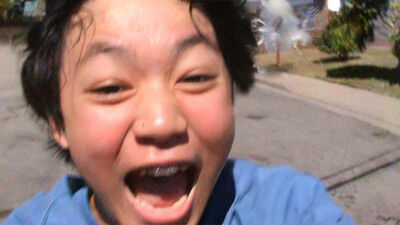Between “The Farewell,” “Minari,” and “Past Lives,” lately, Sundance has been a launching pad for Asian American cinema. Even “The Minding the Gap,” the film that most comes to mind when watching Sean Wang’s highly personal skater film, “Didi,” traces its roots to the festival. “Didi” isn’t a scratch on those works, but there is an affecting, albeit, thinly conceived story at its heart.
Wang’s coming-of-age narrative opens with Didi (Izaac Wang)—some call him either Wang Wang or Chris—shakily running with a camcorder away from an exploding mailbox. At 13-years-old, Chris, who lives in Fremont, California, is at that age when boys can be one part mean and another part psychotic. He and his sister Vivien (Shirley Chen), who’s departing for college, are constantly bickering (he inflicts a couple heinous pranks on her). His father is away, working in Taiwan, leaving Didi’s mother (Joan Chen) to care for her mother-in-law (Chang Li Hua), who thinks she is unworthy of her son’s affections.
Though it pains me to label any film set in 2008 as a period piece, “Didi” captures the first social media generation well, integrating AIM, Myspace, and Facebook to show how technology intermingled with these young teens’ social dynamics. Chris, for instance, has a crush on Madi (Mahaela Park), but speaking and interacting with girls isn’t a strong suit. While these scenes of young adoration are sturdy, the interpersonal dynamics within Chris’ family are underwritten. This is the rare instance of a film probably needing another fifteen minutes to wholly land its themes.
“Didi” is a conventionally shot film, save for a few surreal swings that make you wish Wang pushed the visual envelope. It’s also a work that lives and dies on the performances by Wang and Chen, especially as Chris begins to fall in with an older crowd, causing him to lash out, experiment with drugs, and even turn violent. Thankfully, Wang and Chen are up to the task, trading aching barbs and healing words. They’re enough to give this film a hint of sweetness and warmth, even when Wang is working too hard to conjure crowd-pleasing tears.

